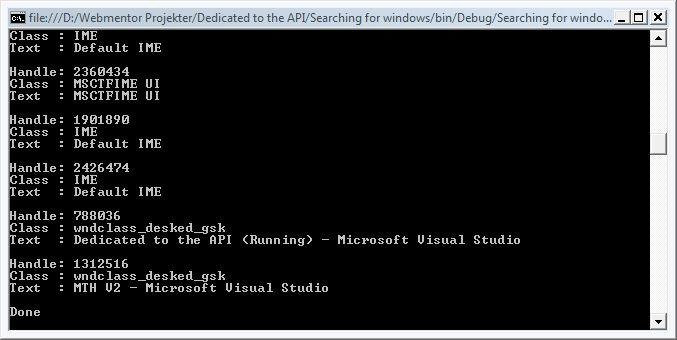Apr
07
2007
Last time I made an example of how to enumerate windows. This time I present to you a class that greatly simplifies the process of searching for specific windows, types of windows, windows belonging to a specific process, having a specific text. You can search for any number of these parameters at the same time, using regular expressions for all string matches to provide optimal flexibility.
using System.Runtime.InteropServices;
using System;
using System.Text;
using System.Text.RegularExpressions;
using System.Diagnostics;
namespace Searching_for_windows
{
class Program
{
// Win32 constants.
const int WM_GETTEXT = 0x000D;
const int WM_GETTEXTLENGTH = 0x000E;
// Win32 functions that have all been used in previous blogs.
[DllImport("User32.Dll")]
private static extern void GetClassName(int hWnd, StringBuilder s, int nMaxCount);
[DllImport("User32.dll")]
private static extern int GetWindowText(int hWnd, StringBuilder text, int count);
[DllImport("User32.dll")]
private static extern Int32 SendMessage(int hWnd, int Msg, int wParam, StringBuilder lParam);
[DllImport("User32.dll")]
private static extern Int32 SendMessage(int hWnd, int Msg, int wParam, int lParam);
// Main entrypoint function
static void Main(string[] args)
{
WindowFinder wf = new WindowFinder();
// Find all Internet Explorer instances
wf.FindWindows(0, null, null, new Regex("iexplore"), new WindowFinder.FoundWindowCallback(foundWindow));
// Find all visual studio instances
wf.FindWindows(0, null, new Regex(" - Microsoft Visual Studio"), new Regex("devenv"), new WindowFinder.FoundWindowCallback(foundWindow));
Console.WriteLine("Done");
Console.Read();
}
// Gets called each time a window is found by the WindowFinder class.
private static bool foundWindow(int handle)
{
// Print the window info.
printWindowInfo(handle);
// Continue on with next window.
return true;
}
// Prints basic properties of a window, uses function already used in previous blogs.
private static void printWindowInfo(int handle)
{
// Get the class.
StringBuilder sbClass = new StringBuilder(256);
GetClassName(handle, sbClass, sbClass.Capacity);
// Get the text.
int txtLength = SendMessage(handle, WM_GETTEXTLENGTH, 0, 0);
StringBuilder sbText = new StringBuilder(txtLength + 1);
SendMessage(handle, WM_GETTEXT, sbText.Capacity, sbText);
// Now we can write out the information we have on the window.
Console.WriteLine("Handle: " + handle);
Console.WriteLine("Class : " + sbClass);
Console.WriteLine("Text : " + sbText);
Console.WriteLine();
}
}
/// <summary>
/// A class used for finding windows based upon their class, title, process and parent window handle.
/// </summary>
public class WindowFinder
{
// Win32 constants.
const int WM_GETTEXT = 0x000D;
const int WM_GETTEXTLENGTH = 0x000E;
// Win32 functions that have all been used in previous blogs.
[DllImport("User32.Dll")]
private static extern void GetClassName(int hWnd, StringBuilder s, int nMaxCount);
[DllImport("User32.dll")]
private static extern int GetWindowText(int hWnd, StringBuilder text, int count);
[DllImport("User32.dll")]
private static extern Int32 SendMessage(int hWnd, int Msg, int wParam, StringBuilder lParam);
[DllImport("User32.dll")]
private static extern Int32 SendMessage(int hWnd, int Msg, int wParam, int lParam);
[DllImport("user32")]
private static extern int GetWindowThreadProcessId(int hWnd, out int lpdwProcessId);
// EnumChildWindows works just like EnumWindows, except we can provide a parameter that specifies the parent
// window handle. If this is NULL or zero, it works just like EnumWindows. Otherwise it'll only return windows
// whose parent window handle matches the hWndParent parameter.
[DllImport("user32.Dll")]
private static extern Boolean EnumChildWindows(int hWndParent, PChildCallBack lpEnumFunc, int lParam);
// The PChildCallBack delegate that we used with EnumWindows.
private delegate bool PChildCallBack(int hWnd, int lParam);
// This is an event that is run each time a window was found that matches the search criterias. The boolean
// return value of the delegate matches the functionality of the PChildCallBack delegate function.
private event FoundWindowCallback foundWindow;
public delegate bool FoundWindowCallback(int hWnd);
// Members that'll hold the search criterias while searching.
private int parentHandle;
private Regex className;
private Regex windowText;
private Regex process;
// The main search function of the WindowFinder class. The parentHandle parameter is optional, taking in a zero if omitted.
// The className can be null as well, in this case the class name will not be searched. For the window text we can input
// a Regex object that will be matched to the window text, unless it's null. The process parameter can be null as well,
// otherwise it'll match on the process name (Internet Explorer = "iexplore"). Finally we take the FoundWindowCallback
// function that'll be called each time a suitable window has been found.
public void FindWindows(int parentHandle, Regex className, Regex windowText, Regex process, FoundWindowCallback fwc)
{
this.parentHandle = parentHandle;
this.className = className;
this.windowText = windowText;
this.process = process;
// Add the FounWindowCallback to the foundWindow event.
foundWindow = fwc;
// Invoke the EnumChildWindows function.
EnumChildWindows(parentHandle, new PChildCallBack(enumChildWindowsCallback), 0);
}
// This function gets called each time a window is found by the EnumChildWindows function. The foun windows here
// are NOT the final found windows as the only filtering done by EnumChildWindows is on the parent window handle.
private bool enumChildWindowsCallback(int handle, int lParam)
{
// If a class name was provided, check to see if it matches the window.
if (className != null)
{
StringBuilder sbClass = new StringBuilder(256);
GetClassName(handle, sbClass, sbClass.Capacity);
// If it does not match, return true so we can continue on with the next window.
if (!className.IsMatch(sbClass.ToString()))
return true;
}
// If a window text was provided, check to see if it matches the window.
if (windowText != null)
{
int txtLength = SendMessage(handle, WM_GETTEXTLENGTH, 0, 0);
StringBuilder sbText = new StringBuilder(txtLength + 1);
SendMessage(handle, WM_GETTEXT, sbText.Capacity, sbText);
// If it does not match, return true so we can continue on with the next window.
if (!windowText.IsMatch(sbText.ToString()))
return true;
}
// If a process name was provided, check to see if it matches the window.
if (process != null)
{
int processID;
GetWindowThreadProcessId(handle, out processID);
// Now that we have the process ID, we can use the built in .NET function to obtain a process object.
Process p = Process.GetProcessById(processID);
// If it does not match, return true so we can continue on with the next window.
if (!process.IsMatch(p.ProcessName))
return true;
}
// If we get to this point, the window is a match. Now invoke the foundWindow event and based upon
// the return value, whether we should continue to search for windows.
return foundWindow(handle);
}
}
}
And the result:
Mark S. Rasmussen
